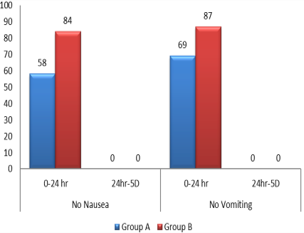Abstract
Breast cancer is mainly formed in the tissues of the breast, and it spreads through the lymphatic system. They are mostly found in women rather than men. The breast cancer incidence has been increasing globally, with 1 in 8 women developing cancer in their lifetime. This prospective observational study was conducted to determine the Chemotherapy-Induced Nausea and Vomiting (CINV) in post-mastectomy breast cancer patients for nine months in a tertiary care hospital. Sixty patients were divided into two groups where one arm received Olanzapine, and the other received aprepitant. Both the arms were analysed for the severity of nausea and vomiting. Aprepitant (APT) is a neurokinin one receptor antagonist (NK1RA) which is used as antiemetic in the prophylaxis of CINV. Olanzapine (OLP) is a second-generation antipsychotic agent, which works by blocking the serotonin receptor. The objective of the study is to Evaluate the Safety and Efficacy of APT versus OLP in preventing CINV in breast cancer patients on Docetaxel-Adriamycin-Cyclophosphamide regimen. The OLP is more effective than APT in antiemetic therapy.
Full text article
Authors

This work is licensed under a Creative Commons Attribution-NonCommercial-NoDerivatives 4.0 International License.

